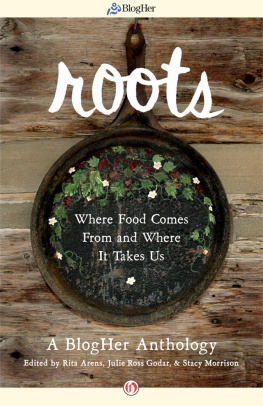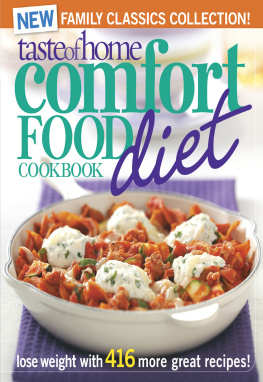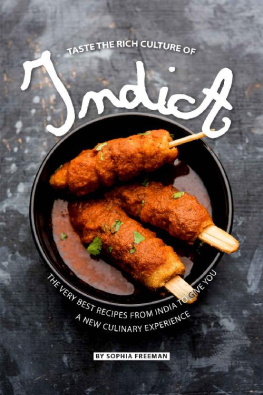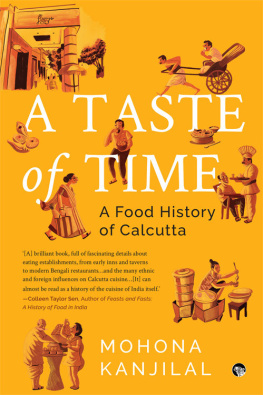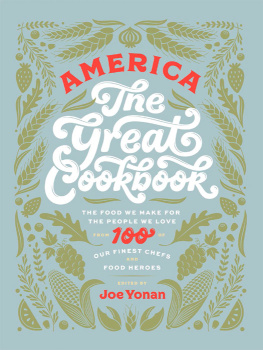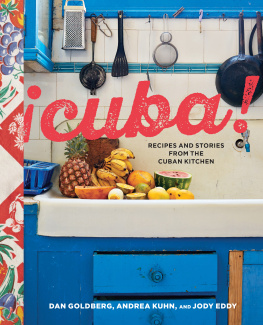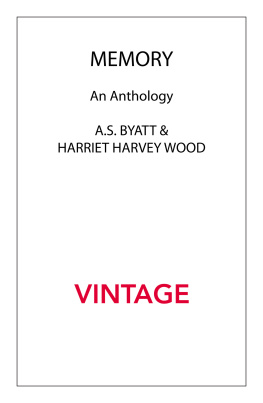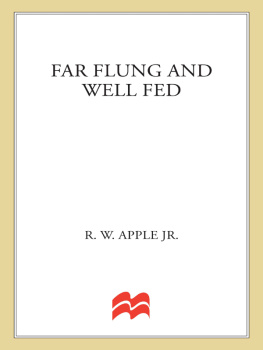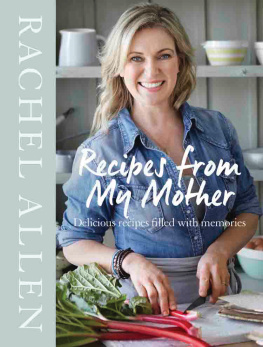
ROOTS
Where Food Comes From and Where It Takes Us
A BlogHer Anthology
Edited by Rita Arens, Julie Ross Godar, and Stacy Morrison

Introduction
By Donna Pierce
Black America Cooks and Skillet Diaries
Where Food Comes From and Where It Takes Us
MY GRANDMOTHER WAS BORN in 1909, so she didnt own a fax machine during her lifetime. Fax machines were still awkward and unpredictable in 1997, when I heard mine beep, followed by the sound of a waxy sheet of paper creeping upward from the roll.
But there was no mistaking Grannys elegant, round handwriting as the words BAKED CRAB inched their way up. I caught my breath and froze as I watched my grandmother continue to communicate with me.
Saut in a little oil add butter DONT LET BROWN, she reminded meas if I were standing in her Mobile, Alabama, kitchen, preparing a giant bowl of deviled crab to spoon into the dozens of porcelain crab and mini scallop shells she collected.
More instructions caught my attention: NO LUMPS, she had written to describe how to mash the dried bread slices into a paste.
Thanks, Granny, I said aloud. The last time I prepared this favorite dish for a cocktail party, I hadnt remembered the no-lumps warning.
My grandmother definitely took cooking seriously. I recognized the warnings in her recipe as instructions for her oldest grandchild, the one who spent the most time with her in the kitchen, the granddaughter she had taught how to make a dark roux without lumps and the precise moment to turn the heat off under the shrimp creole to make it flavorful without overcooking.
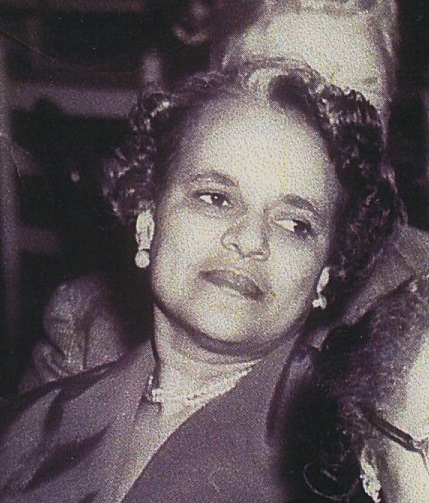
Still standing by the fax machine, I took a deep breath and closed my eyes, remembering the day before my thirteenth birthday when Granny had anointed me the keeper of the oven flame and explained to me the importance of passing down family recipes.
We were baking rolls, and Granny had just demonstrated the exact moment to brush the puffed but not brown rolls with a sweep of butter from the pastry brush she used only for that purpose. She closed the oven door and turned to me with a serious expression.
A lot goes into duplicating the light, tender rolls my grandmother used to make; its more than just a list of ingredients, she said, wiping her forehead with the lace handkerchief she always carried, freshly laundered, in an apron pocket.
And heres the secret about being the family cook, my grandmother said, returning the handkerchief to her pocket before gently opening and closing the oven door to check on the rolls. Good family cooks live forever, she whispered. At my wide-eyed reaction, she laughed out loud. The memories of good cooks live forever in the family dishes they save and prepare for family celebrations, she explained, adding, my grandmother told me that passing down heirloom recipes is more important than passing down heirloom diamonds, and I think she was right.
Suddenly, Granny inhaled a deep breath and motioned for me to do the same. Remember this aroma. This is exactly the smell you wait for, she said as she opened the oven door to perfect rolls.
Back in my office that day in 1997, the telephone rang. Did you get the fax? my cousin Joan asked. As it turns out, she had given her secretary the yellowing recipe to copy and fax to me for an upcoming family cookbook. The secretary had forgotten to add a cover sheet.
I still feel the fax came from Granny, but indirectlythe way she always described when she explained the importance of passing down recipesliving proof that good family cooks live forever.
Today, when young relatives request lessons in roll making, or gumbo, or our familys most festive dessert, Charlotte Russe, Im careful to point out the knowledge my grandmother passed down to me along with the recipeher tips and techniquesand also her gratitude, patience, and humility.
I understand now, as my grandmother did long ago, that my role as a family cook is just a small chapter in the middle of a big volume to be continued. Our family recipe memories and traditions await the discovery of inspired volunteers from the next generation who share my family cooks passion for passing down our recipe heritage, as I shared my grandmothers, as she shared her grandmothers.
When I was a test kitchen director and food editor for the Chicago Tribune, I interviewedand cooked withmany celebrity chefs and cookbook authors, but nothing excited me more than interviewing family cooks about heritage recipes and memories, then sharing those dishes with my readers. So I found a way to focus on family cooks independently and created BlackAmericaCooks.com, a place to celebrate African American cooks, recipes, and traditions.
Soon, understanding the importance of honoring all family cooks, not just my culture, I wanted to create a place for all ethnic groups to celebrate family cooks and share memories and recipesso I created a second site, named after my grandmothers frequent observation that recipes reveal much more than how to make a dish.
Theyre skillet diaries. We are more alike than we are different, my grandmother used to say about her Italian and Greek immigrant neighbors, who shared pasta, sauce, and pastry recipes over the fence in her unique, very international section of Mobile.
In the months I spent visiting cities, villages, farms, and vineyards in Europe, when strangers became friends after breaking bread and sharing stories about home and our plans and dreams for the future, I remembered Grannys observations. Her words echo back to me today, when essays and blogs about food and recipes help me uncover obvious similarities underneath ethnic and cultural differences. And in the stories in this book, of becoming who we are through remembering, discovering, and sharing recipes and traditions, I see it once again: We are indeed more alike than we are different.
Ive begun to think of sharing food memories as a delicious recipe for peace on earth.
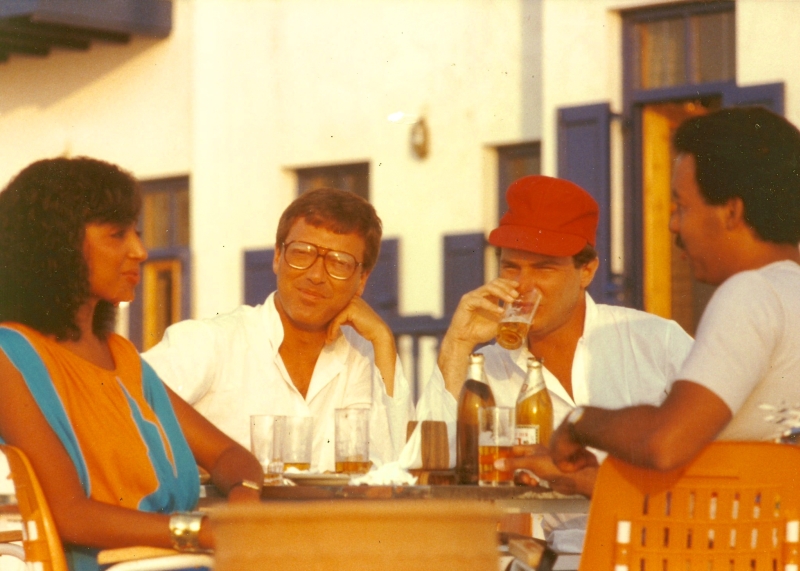
MEMORY
Cheap Cream Cake
By Mary Ann Parker
Kitchen Keepers
THREE DAYS AFTER CHRISTMAS in 1963, I stepped into the long, white dress I had just finished sewing, looped my arm through my fathers, and grinned as I walked down the aisle of my childhood church toward the man waiting to become my husband. I was finishing the clinical portion of my nursing degree, and Joe was between jobs, so we skipped the honeymoon and drove from Texas to Oklahoma City to move into our first home. This tiny, furnished apartment was attached to another rental property. It looked like a playhouse because of its size, and definitely needed a lot of TLC. Joe painted, I cleaned, and as we moved our boxes of old stuff and new wedding gifts in, we were amazed how quickly the little kitchen, living room, and bedroom filled up.
Before I loaded kitchen gear into the few drawers there, I pulled out each, cleaned it, and lined it with shelf paper. As I opened the narrow drawer to the right of the small electric cooktop, I realized that one was not empty.
Next page
